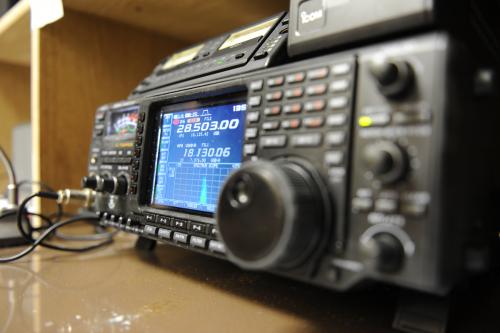
W1YU, the Amateur Radio Club at Yale, will be offering a six session class to cover the material you need to know to earn your entry-level Technician Class Amateur Radio License. Five classes will be held at the W1YU clubhouse and station located in the Graduate Club at 155 Elm Street in New Haven. The sixth session will be a review session and a VE session where the license exam will be given.
Dates and times for the classes are:
- Class 1: Tuesday, September 26, 5:30 - 7:30 pm
- Class 2: Thursday, September 28, 5:30-7:30 pm
- Class 3: Saturday, September 30, 1:00-3:00 pm
- Class 4: Tuesday, October 3, 5:30 - 7:.30 pm
- Class 5: Thursday, October 5, 5:30 - 7:30 pm
- Review session & VE Exam Session: Saturday October 7, starting at 1:00 pm.
While we are primarily offering this program for Yale students, faculty and staff, the classes and VE session are open to all persons interested in earning their first amateur radio license. If you ever wanted to get on the air with ham radio, here is your opportunity! We will cover all material needed to pass the 35-question Technician Written Exam (Element 2). The Technician license grants priveleges on all VHF/UHF amateur bands (frequencies above 30 MHz, and limited operations in certain HF (shortwave) bands.
From the American Radio Relay League website (http://www.arrl.org/getting-licensed)…
Why should I get licensed?
Before you can get on the air, you need to be licensed and know the rules to operate legally.
The FCC Technician License exam covers basic regulations, operating practices and electronics theory, with a focus on VHF and UHF applications. Morse code is not required for this license. With a Technician Class license, you will have all ham radio privileges above 30 MHz. These privileges include the very popular 2-meter band. Many Technician licensees enjoy using small (2 meter) hand-held radios to stay in touch with other hams in their area. Technicians may operate FM voice, digital packet (computers), television, single-sideband voice and several other interesting modes. You can even make international radio contacts via satellites, using relatively simple station equipment. Technician licensees now also have additional privileges on certain HF frequencies. Technicians may also operate on the 80, 40 and 15 meter bands using CW, and on the 10 meter band using CW, voice and digital modes.
For more information or to sign up for the course, please contact either Scott Matheson N3NFP at scott.matheson@yale.edu or James Surprenant, AB1DQ at james.surprenant@yale.edu.